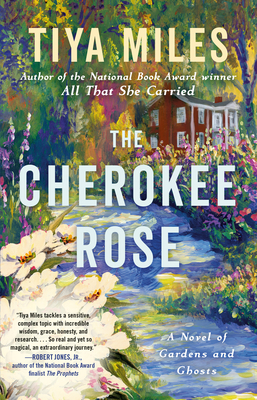Synopsis
Three women uncover the secrets of a Georgia plantation that embodies the intertwined histories of Indigenous and enslaved Black communities—the fascinating debut novel, inspired by a true story, of the National Book Award-winning and New York Times bestselling author of All That She Carried , now featuring a new introduction.
“ The Cherokee Rose is a mic drop—an instant classic. An invitation to listen to the urgent, sweet choruses of past and present.”—Honorée Fanonne Jeffers, author of The Love Songs of W.E.B. Du Bois
LAMBDA LITERARY AWARD FINALIST
Conducting research for her weekly history column, Jinx, a free-spirited Muscogee (Creek) historian, travels to Hold House, a Georgia plantation originally owned by Cherokee chief James Hold, to uncover the mystery of what happened to a tribal member who stayed behind after Indian removal, when Native Americans were forcibly displaced from their ancestral homelands in the nineteenth century.
At Hold House, she meets Ruth, a magazine writer visiting on assignment, and Cheyenne, a Southern Black debutante seeking to purchase the estate. Hovering above them all is the spirit of Mary Ann Battis, the young Indigenous woman who remained in Georgia more than a century earlier. When they discover a diary left on the property that reveals even more about the house’s dark history, the three women’s connections to the place grow deeper. Over a long holiday weekend, Cheyenne is forced to reconsider the property’s rightful ownership, Jinx reexamines assumptions about her tribe’s racial history, and Ruth confronts her own family’s past traumas before surprising herself by falling into a new romance.
Imbued with a nuanced understanding of history, The Cherokee Rose brings the past to life as Jinx, Ruth, and Cheyenne unravel mysteries with powerful consequences for them all.
The Good
I. I appreciate the books and articles put at back of this book I want to read them.
II. Historical fiction portions were my favorite parts of the novel (midkey think that this story would have been improved by being purely historical fiction)
III. It did make me think about plantations, history between Native Americans & Black Americans & complexities, quiet activism, conceptualizing history, and more.
The Bad
I. Characterization lacking
A. Kept mistaking characters for each other because they do not have a strong voice as people.
B. Characters were mouthpieces for history, and it felt at times the history was random/not interesting/we already know this.
C. They felt like they were plucked out of 90s Black contemporary novels without change to accommodate this story.
II. Writing
A. Personally, felt that the story did not go hard as it could have looking at the premise: Why are we focusing on this? Why is the characterization like this?
I guess I just feel it was a missed opportunity with the story that this is.
B. Writing did not fit the story that was being told.
C. It felt like author was adding stuff as the story was going along instead of it feeling craftily done.
D. It retraced many of what other stories about Black American experiences did.
Thoughts
I. My Personal Recommendation of novels/nonfiction
Darkly by Leila Taylor – nonfiction
Conjure Women by Afia Atakora- historical fiction, adult
Deathless Divide – ya, historical fiction, fantasy/science fiction (did not read Dread Nation but it is not lost on me that I am recommending the second in a series that was critiqued for its portrayal of Native Americans)
II. Makes me want to research plantations, flowers, memory gardens, Vann plantation, all nonfiction Tiya Miles wrote, all books that the author mentioned.
III. Different relations/concepts of legacy with land between different races
IV. Is the message dated or too simple? Does the story improve by a discussion/class setting?
V. What should we do with a plantation? Is it offensive to turn it into a bed & breakfast? Should we destroy them all? Should/can we give them back to descendants of those who were enslaved on the land?
VI. It was published in 2015 but written (if I am not mistaken in 90s/early 2000s) I think that shaped many of things (good and bad) – Does the messages feel done before because this is from 2015 (when this could have been more progressive)? If this was written and published later what would the story look like? What is the reaction between those who read the story in 2015 vs 2023?
VII. How do folks feel about the Christian aspect?
VIII. Quiet Social justice
A. While reading this book I viewed a reading sprint where the two hosts talked about (starting at 1:34:39) Black folks looking back negatively on their ancestors. It made me conceptualize my thoughts alongside the book about how so much social justice by Black Americans was/is quiet out of survival. How much can we judge what our ancestors did when so much of what they did was/is lost to time because of it needing to be a secret?
C. All the quiet histories in a Black family line.
IX. Humanizing history -Need for heroes/villains in history without context to time or what a person was experiencing.
X. Ghosts
A. I really had it in my mind that this story was going to be a legit thriller/horror ghost haunting revenge novel vs historical fiction/contemporary slight ghost story. In my expectations the revenge was going to be towards Native Americans and white people who enslaved the Black folks which would bring discourse towards relations between these groups.
B. Ghost stories: Lovecraft Country, The Cherokee Rose, etc. Is the ghosts goal revenge? What is their motive? Why are they haunting/existing on the land still? Are they stuck? what is the authorial intent with the ghosts?
I won this in a giveaway from Random House Book Club via goodreads
